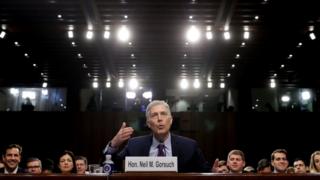 Image copyright
Image copyright
Getty Images
Neil Gorsuch said he would not be listing his favourite or least favourite precedents
Donald Trump’s pick for the vacant seat on the Supreme Court has insisted that no-one, including the president who nominated him, is above the law.
Neil Gorsuch also told his Senate confirmation hearing that no-one had asked him to make any promises on how he would rule.
He said he would have “walked out” if Mr Trump had asked him to overturn the landmark Roe v Wade abortion ruling.
But he said it would be wrong to say how he would rule on any given case.
That would be the “beginning of the end” of an independent judiciary, he said.
Mr Gorsuch, nominated for the seat vacated by the death of Justice Antonin Scalia 13 months ago, is facing two days of intense grilling in the Senate Judicial Committee.
The first question on Tuesday, from chairman Chuck Grassley, asked if he would have “any trouble ruling against a president who appointed you”.
Mr Gorsuch said: “I have no difficulty ruling against, or for, any party, other than based on what the law and facts in the particular case require.
“There’s no such thing as a Republican judge or a Democratic judge. We just have judges in this country.”
- Who is Neil Gorsuch?
- Who are the current eight justices?
- Why is the Supreme Court so important?
- What is the nuclear option?
Insisting on the separation of powers between the judiciary and the legislature, he said: “Judges would make pretty rotten legislators – we are life tenured, you can’t get rid of us, it would be a pretty poor way to run a democracy.”
He was later asked directly if he was a surrogate for President Trump and replied: “No.”
Mr Gorsuch said on several occasions “no-one is above the law”, including when asked whether Mr Trump could be prosecuted if he reinstated illegal interrogation techniques such as the now-banned water-boarding. Mr Trump has in the past backed the process and vowed during his election campaign to “bring back a hell of a lot worse”.
Ranking Democrat Dianne Feinstein spent her 30 minutes touching on three areas Mr Gorsuch will continue to be pressed on – abortion, gun control and employee rights.
Ms Feinstein asked whether the landmark 1973 ruling Roe v Wade, which legalised abortion, should be protected as a “super precedent” – a ruling so ingrained in law it is hard to overturn.
Mr Gorsuch acknowledged the case was a reaffirmed precedent, but added: “I’m not in a position to tell you whether I personally like or dislike a precedent. That’s not relevant to my job.”
Mr Gorsuch told Senator Lindsey Graham that he had not met Mr Trump before his interview for the post.
Mr Graham asked if Mr Trump had called on him in the interview to overturn Roe v Wade. Mr Gorsuch said “No”, and that if he had done so, “I would have walked out of the door.”
On employee rights, Democrats have targeted Mr Gorsuch’s dissenting opinion supporting a transportation firm that sacked a driver for defying an order to stay in a freezing, broken-down lorry.
Image copyright
AP
Sheldon Whitehouse’s questioning appeared to be the most uncomfortable for Mr Gorsuch
Mr Gorsuch said that in 2,700 opinions he had given, he had often ruled “for the little guy instead of the big guy”.
He was also asked about Mr Trump’s travel ban on people from six mainly Muslim nations, saying again that no-one could know how he would rule.
Reminded of one congressman who said it would be good to have him on the court to back the ban, Mr Gorsuch said: “A lot of people say a lot of silly things.”
Mr Gorsuch was far less comfortable when asked by Sheldon Whitehouse about what the senator said was a $10m campaign funded by “dark money” – cash from unnamed sources – backing his nomination.
Mr Gorsuch said he knew of the campaign but did not know those sourcing it, before adding that it was up to Congress to pass laws that would disclose such sources.
Limited options
It remains unclear whether Democrats will try to block Mr Gorsuch’s confirmation.
If they do, their options are limited.
Republicans control the Senate and they can change the chamber’s rules to make it easier to confirm Mr Gorsuch if any attempt is made to block him.
They hope to have Judge Gorsuch, currently a judge on the Denver-based 10th US Circuit Court of Appeals, confirmed before Congress leaves for recess on 7 April.
How does the process work?
- Monday: Each of the 20 committee members reads a 10-minute statement, followed by Mr Gorsuch
- Tuesday-Wednesday: Each committee member grills Mr Gorsuch on a range of political and legal issues
- Thursday: Outside witnesses testify for or against the nomination
- Committee vote: Members report the nomination to the full Senate, favourably, unfavourably or without recommendation
- Senate procedural vote: Republicans have a 52-48 majority in the Senate but Democrats can push to raise the required threshold to 60 votes. If they do, Republicans can use the so-called “nuclear option” to change the rules to allow a lower vote threshold
- Senate full vote: Will be a simple majority, if the above procedural hurdles are overcome
Supreme Court pick Gorsuch says Trump not above law

